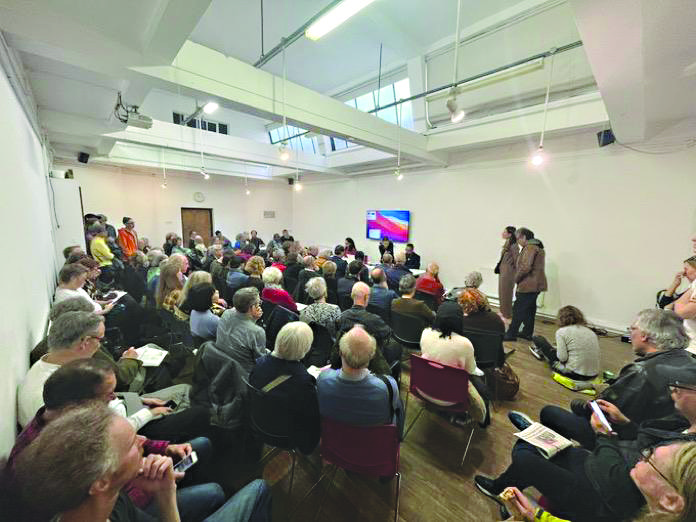#NLCOP: How the media misses the big picture on climate change
The New Journal and Islington Tribune organised a day of debate and discussion at Conway Hall in Holborn
Friday, 18th November 2022 — By Anna Lamche

The packed out talk on the media’s role in the fightback against climate change
THE mainstream media is failing to give its audience the full picture on climate change, it was warned this week at our North London COP event.
A combination of “simplistic” or misleading reporting and financial pressure often leaves media outlets incapable of revealing the true scale of the problem, our panellists said on Saturday.
Speaking in the first discussion of the day, Dr Nafeez Ahmed of the Byline Times said the media in its present state is “ideologically siloed”, meaning different areas of expertise are reported on in isolation – with the result that the media regularly fails to give their audiences the bigger picture.
“Everything’s changing: the energy, the economics, the finance, the culture – we’re going through this massive change,” Dr Ahmed said.
“We need frameworks that piece things together. I think this is the biggest problem when you’re looking at the media and the reporting you’re seeing is to remember that conventional pundits and journalists do not understand how the system works.
He added: “That’s the kind of thing that we need, to understand how things are actually working: how is the economy embedded in the environment, in energy, how does this connect with the food system? He added that lots of media coverage tends to remain focused on the “symptoms” of environmental collapse – such as climate protesting and migration – rather than its deeper causes.
“It’s not a surprise when you have a situation where we have an escalating crisis, and the result is that sometimes people in the media will move to very simplistic, knee-jerk responses,” he said.
Meanwhile, former Metro Style editor Bel Jacobs warned audiences about “lifestyle” journalism that “gives the impression of an industry that’s doing stuff when it isn’t really doing stuff. And that for me is the ultimate greenwashing. It’s cognitive dissonance on another level…It makes you think everything’s kind of OK.”
She added traditional media funding models also hampers truthful climate reporting.
“Advertisers are calling the shots, but they only really want to stay in existence to make more profit,” she said.
Ms Jacobs, who has since left Metro, said her focus is now on “solutions-focused journalism” – reporting that reflects “the culture changes that we need to see, the re-valuing that we need to see”, adding: “We need to stop valuing the stuff that we buy, and start valuing things that are, unfortunately, disappearing.”
She called for journalists to “put ourselves in service to nature… if we follow this ideology of restoration, regeneration, resilience – we have hope.”